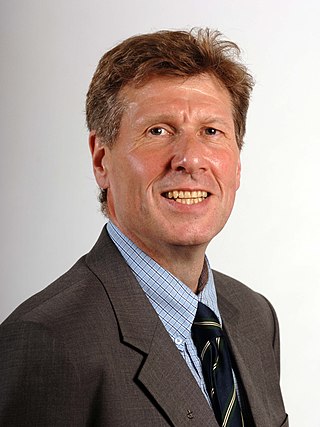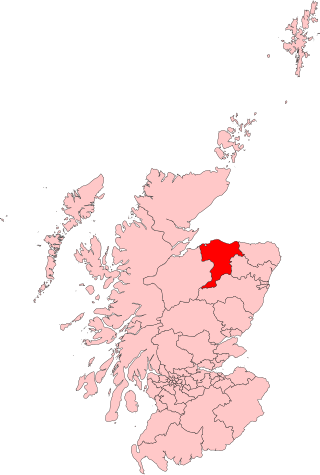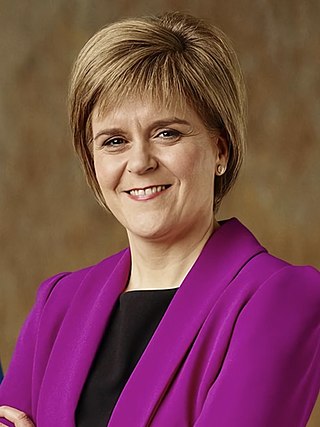
Kenneth Wright MacAskill is a Scottish politician who was Member of Parliament (MP) for East Lothian from 2019 to 2024. He previously served as Cabinet Secretary for Justice from 2007 to 2014 and was a Member of the Scottish Parliament (MSP) from 1999 to 2016. A former member of the Scottish National Party (SNP), he defected to the Alba Party in 2021 and currently serves as the party's acting leader, following former leader Alex Salmond's death in October 2024.
Douglas Henderson was a Scottish politician. He was Depute Leader of the Scottish National Party (SNP) from 1971 to 1973 and from 1979 to 1981. He served as a Scottish National Party Member of Parliament (MP) for East Aberdeenshire from 1974 to 1979, and held virtually every national office in the SNP, short of party leader. His political style has been described as "no-nonsense" and "very blunt and forthright". He was also known for his forceful public speaking, which former SNP leader Alex Salmond described as "messianic".

John David Home Robertson is a retired Labour politician in Scotland. He was a Member of Parliament (MP) for Berwick and East Lothian and East Lothian from 1978 to 2001 and a Member of the Scottish Parliament (MSP) for East Lothian from 1999 until 2007.
In Scotland, the Scottish National Party (SNP) is a left social democratic political party which campaigns for Scottish independence. The SNP has controlled Scotland's devolved legislature since the 2007 election as a minority government, and were a majority government from the 2011 election and have been a minority government, since the 2016 election.

Lothian East is a constituency in Scotland which returns one Member of Parliament (MP) to the House of Commons of the Parliament of the United Kingdom, elected by the first-past-the-post voting system.

Livingston is a county constituency of the House of Commons of the Parliament of the United Kingdom, to which it returns one Member of Parliament (MP). Elections are held using the first-past-the-post voting system.

Stirling was a county constituency of the House of Commons of the Parliament of the United Kingdom. It elected one Member of Parliament (MP) by the first past the post system of election.

Moray was a county constituency of the House of Commons of the Parliament of the United Kingdom. It elected one Member of Parliament (MP) by the first past the post system of election.

East Renfrewshire is a constituency of the UK House of Commons, to the south of Glasgow, Scotland. It elects one Member of Parliament (MP) using the first-past-the-post system of voting. It has been represented since 2024 by Blair McDougall of Scottish Labour.
The 1967 Hamilton by-election in Hamilton, Lanarkshire, Scotland, was held on 2 November 1967. It was called after the former Labour MP, Tom Fraser, resigned in order to take up the position as head of the North of Scotland Hydro-Electric Board. The constituency had been a safe seat for Labour, who had taken over two-thirds of the vote there in every general election from 1945 to 1966, when only the Conservatives had stood against them.

The 2011 Scottish Parliament election was held on Thursday, 5 May 2011 to elect 129 members to the Scottish Parliament.

The 2007 Scottish Parliament election was held on Thursday 3 May 2007 to elect members to the Scottish Parliament. It was the third general election to the devolved Scottish Parliament since it was created in 1999. Local elections in Scotland fell on the same day.
On 1 March 1979 a by-election was held for the House of Commons constituency of Clitheroe in Lancashire. It was won by the Conservative Party candidate David Waddington.

The 1973 Berwick-upon-Tweed by-election was a parliamentary by-election held on 8 November 1973 for the House of Commons constituency of Berwick-upon-Tweed. It was one of four UK by-elections held on the same day.
The 1978 Glasgow Garscadden by-election was a parliamentary by-election held on 13 April 1978 for the House of Commons constituency of Glasgow Garscadden, in the north-west periphery of Glasgow.

A general election was held in the United Kingdom on 6 May 2010 and all 59 seats in Scotland were contested. The election result in Scotland was unusual in that there wasn't any change of seats from the 2005 general election, although the Labour Party took back two seats that it had lost in by-elections. This was the last general election at which the Labour Party won a majority of seats and plurality of votes in Scotland until 2024.

2012 Elections to East Lothian Council were held on 3 May 2012, on the same day as the other Scottish local government elections. The election used the 7 wards created as a result of the Local Governance (Scotland) Act 2004, with each ward electing three or four councillors using the single transferable vote system form of proportional representation, with 23 councillors elected.

A general election was held in the United Kingdom on 7 May 2015 and all 59 seats in Scotland were contested under the first-past-the-post, single-member district electoral system. Unlike the 2010 general election, where no seats changed party, the Scottish National Party (SNP) won all but three seats in Scotland, gaining a total of 56 seats. The SNP received what remains the largest number of votes gained by a single political party in a United Kingdom general election in Scotland in British history, breaking the previous record set by the Labour Party in 1964 and taking the largest share of the Scottish vote in sixty years, at approximately 50 per cent.
Isobel Lindsay is a former sociology lecturer, known as a Scottish nationalist and peace activist.

A general election was held in the United Kingdom on Thursday 8 June 2017; all 59 seats in Scotland were contested under the first-past-the-post electoral system.














